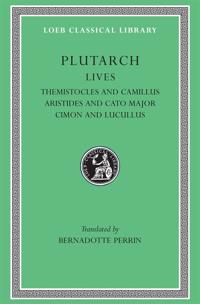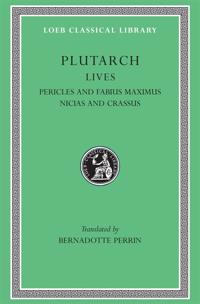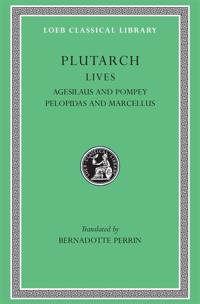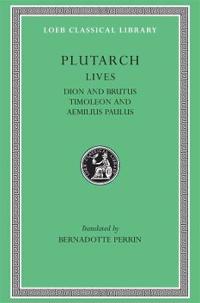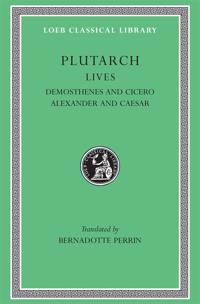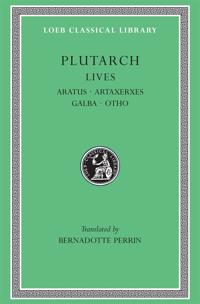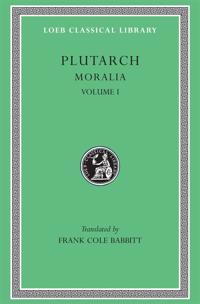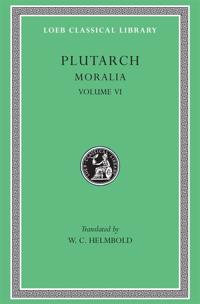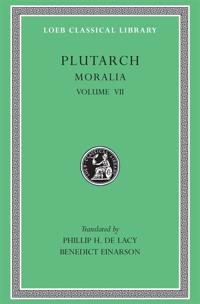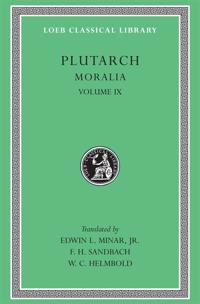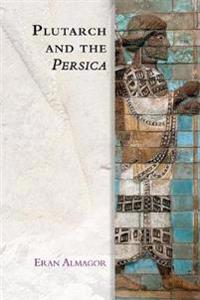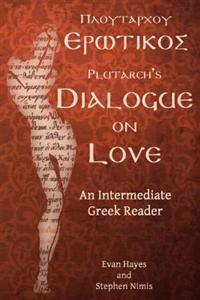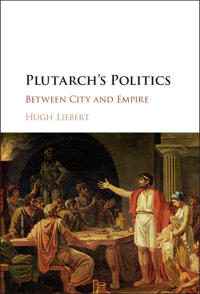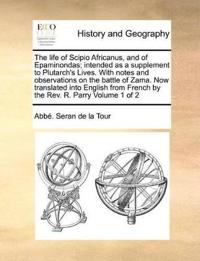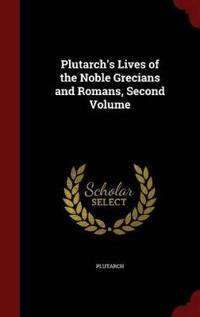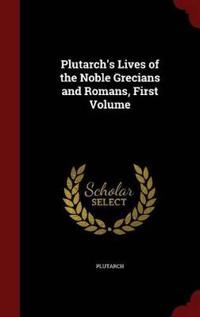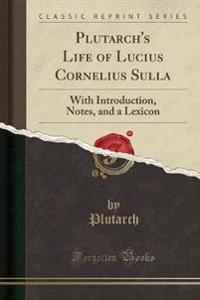Plutarch's Lives
ISBN: 9780674990531 - UTGIVEN: 1914-06Plutarch (c. 45 120 CE) wrote on many subjects. His forty-six Parallel Lives are biographies planned to be ethical examples in pairs, one Greek figure and one similar Roman, though the last four lives are single. They not only record careers and illustrious deeds but also offer rounded portraits of [...]
Lives (Inbunden)
avPlutarch
ISBN: 9780674990722 - UTGIVEN: 191612Plutarch (Plutarchus), ca. 45-120 CE, was born at Chaeronea in Boeotia in central Greece, studied philosophy at Athens, and, after coming to Rome as a teacher in philosophy, was given consular rank by the emperor Trajan and a procuratorship in Greece by Hadrian. He was married and the father of one [...]
Plutarch's Lives
ISBN: 9780674990890 - UTGIVEN: 1989-01Plutarch (c. 45 120 CE) wrote on many subjects. His forty-six Parallel Lives are biographies planned to be ethical examples in pairs, one Greek figure and one similar Roman, though the last four lives are single. They not only record careers and illustrious deeds but also offer rounded portraits of [...]
Parallel Lives (Inbunden)
avPlutarch
ISBN: 9780674990975 - UTGIVEN: 198907Plutarch (Plutarchus), ca. 45-120 CE, was born at Chaeronea in Boeotia in central Greece, studied philosophy at Athens, and, after coming to Rome as a teacher in philosophy, was given consular rank by the emperor Trajan and a procuratorship in Greece by Hadrian. He was married and the father of one [...]
Parallel Lives (Häftad)
avPlutarch
ISBN: 9780674991095 - UTGIVEN: 191812Plutarch (Plutarchus), ca. 45-120 CE, was born at Chaeronea in Boeotia in central Greece, studied philosophy at Athens, and, after coming to Rome as a teacher in philosophy, was given consular rank by the emperor Trajan and a procuratorship in Greece by Hadrian. He was married and the father of one [...]
Lives (Inbunden)
avPlutarch
ISBN: 9780674991101 - UTGIVEN: 198507Plutarch (Plutarchus), ca. 45-120 CE, was born at Chaeronea in Boeotia in central Greece, studied philosophy at Athens, and, after coming to Rome as a teacher in philosophy, was given consular rank by the emperor Trajan and a procuratorship in Greece by Hadrian. He was married and the father of one [...]
Lives (Inbunden)
avPlutarch
ISBN: 9780674991118 - UTGIVEN: 191912Plutarch (Plutarchus), ca. 45-120 CE, was born at Chaeronea in Boeotia in central Greece, studied philosophy at Athens, and, after coming to Rome as a teacher in philosophy, was given consular rank by the emperor Trajan and a procuratorship in Greece by Hadrian. He was married and the father of one [...]
Lives (Häftad)
avPlutarch
ISBN: 9780674991149 - UTGIVEN: 192612Plutarch (Plutarchus), ca. 45-120 CE, was born at Chaeronea in Boeotia in central Greece, studied philosophy at Athens, and, after coming to Rome as a teacher in philosophy, was given consular rank by the emperor Trajan and a procuratorship in Greece by Hadrian. He was married and the father of one [...]
Moralia (Inbunden)
avPlutarch
ISBN: 9780674992177 - UTGIVEN: 192712Plutarch (Plutarchus), ca. 45-120 CE, was born at Chaeronea in Boeotia in central Greece, studied philosophy at Athens, and, after coming to Rome as a teacher in philosophy, was given consular rank by the emperor Trajan and a procuratorship in Greece by Hadrian. He was married and the father of one [...]
Plutarch's Moralia
ISBN: 9780674993716 - UTGIVEN: 1939-06Plutarch (c. 45 120 CE) wrote on many subjects. His extant works other than the Parallel Lives are varied, about sixty in number, and known as the Moralia (Moral Essays). They reflect his philosophy about living a good life, and provide a treasury of information concerning Greco-Roman society, tradi[...]
Plutarch Moralia
ISBN: 9780674994461 - UTGIVEN: 1959-06Plutarch (c. 45 120 CE) wrote on many subjects. His extant works other than the Parallel Lives are varied, about sixty in number, and known as the Moralia (Moral Essays). They reflect his philosophy about living a good life, and provide a treasury of information concerning Greco-Roman society, tradi[...]
Moralia (Inbunden)
avPlutarch
ISBN: 9780674994676 - UTGIVEN: 196112Plutarch (Plutarchus), ca. 45-120 CE, was born at Chaeronea in Boeotia in central Greece, studied philosophy at Athens, and, after coming to Rome as a teacher in philosophy, was given consular rank by the emperor Trajan and a procuratorship in Greece by Hadrian. He was married and the father of one [...]
Plutarch's Moralia
ISBN: 9780674994706 - UTGIVEN: 1976-06Plutarch (c. 45 120 CE) wrote on many subjects. His extant works other than the Parallel Lives are varied, about sixty in number, and known as the Moralia (Moral Essays). They reflect his philosophy about living a good life, and provide a treasury of information concerning Greco-Roman society, tradi[...]
Plutarch Moralia
ISBN: 9780674994720 - UTGIVEN: 1967-06Plutarch (c. 45 120 CE) wrote on many subjects. His extant works other than the Parallel Lives are varied, about sixty in number, and known as the Moralia (Moral Essays). They reflect his philosophy about living a good life, and provide a treasury of information concerning Greco-Roman society, tradi[...]
Plutarch's Moralia
ISBN: 9780674995178 - UTGIVEN: 1976-06Plutarch (c. 45 120 CE) wrote on many subjects. His extant works other than the Parallel Lives are varied, about sixty in number, and known as the Moralia (Moral Essays). They reflect his philosophy about living a good life, and provide a treasury of information concerning Greco-Roman society, tradi[...]
Plutarch Moralia
ISBN: 9780674996113 - UTGIVEN: 2004-09Edward O'Neil's thorough index provides an invaluable roadmap for tracking the wealth of information and wisdom to be found in them.[...]
Plutarch and the Persica
ISBN: 9780748645558 - UTGIVEN: 2018-08This book addresses two historical mysteries. The first is the content and character of the fourth century BCE Greek works called the Persica. The second is the method of work of the second century CE biographer Plutarch of Chaeronea who used these works to compose his biographies.[...]
Plutarch's Politics
ISBN: 9781107148789 - UTGIVEN: 2016-08Plutarch's Lives were once treasured. Today they are studied by classicists, known vaguely, if at all, by the educated public, and are virtually unknown to students of ancient political thought. The central claim of this book is that Plutarch shows how the political form of the city can satisfy an i[...]
Plutarch's Lives of the Noble Grecians and Romans, Second Volume
ISBN: 9781297556739 - UTGIVEN: 2015-08Plutarch's Lives of the Noble Grecians and Romans, First Volume
ISBN: 9781298701213 - UTGIVEN: 2015-08Plutarch's Life of Lucius Cornelius Sulla (Classic Reprint) (häftad)
ISBN: 9781330493946 - UTGIVEN: 2015-09

